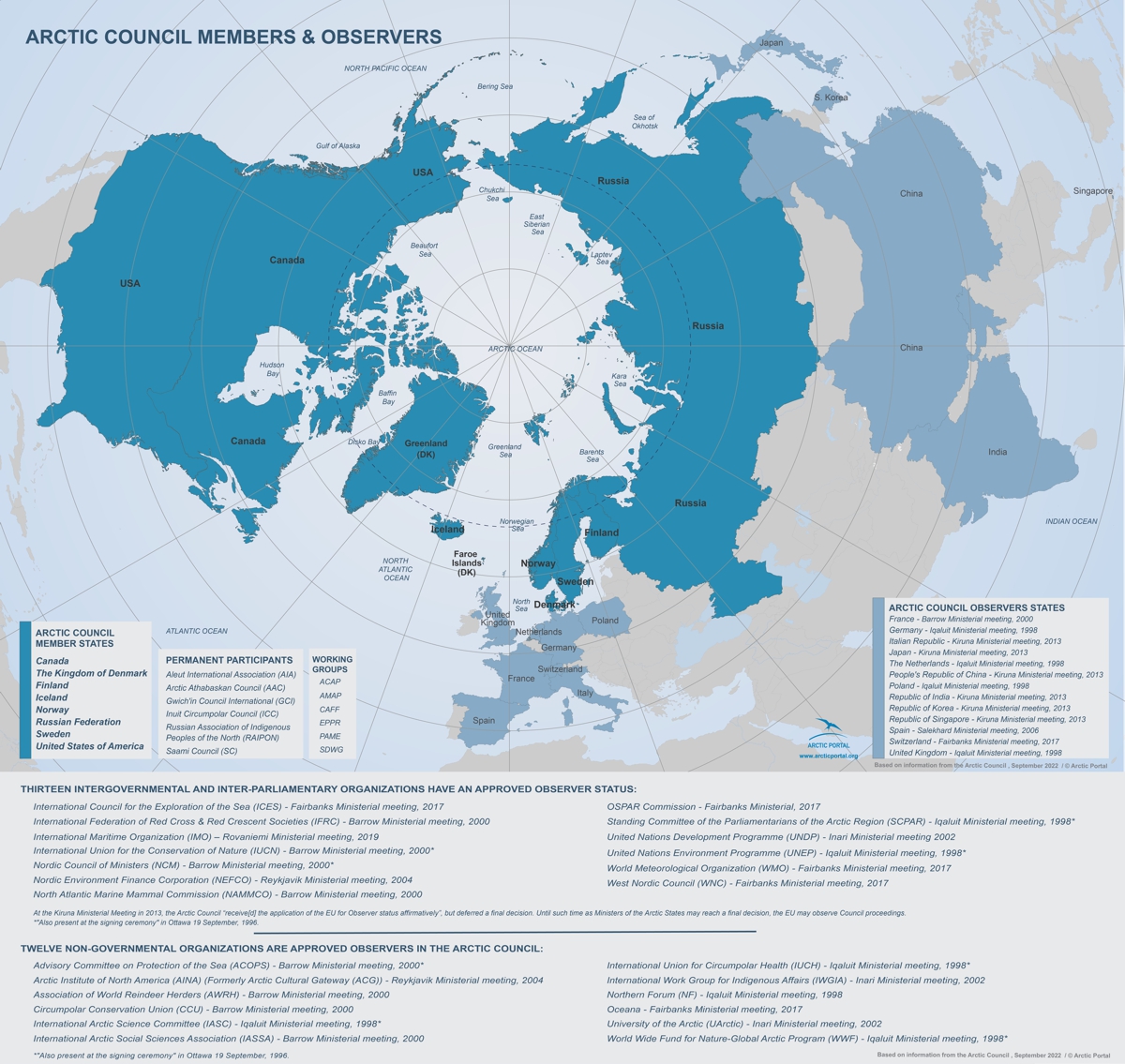Later today Monday the 12th of May, the Kingdom of Denmark, comprising Denmark, the Faroe Islands, and Greenland, will formally assume the chairship of the Arctic Council during its 14th Ministerial Meeting.
In a historic first, Greenland will lead the chairship on behalf of the Kingdom, reflecting both the territory’s growing international role and the Council’s increasing emphasis on Indigenous and Arctic community leadership.
The transition marks the end of Norway’s two-year chairship (2023–2025), which was led by Foreign Minister Espen Barth Eide and Senior Arctic Official Morten Høglund. Norway’s term was dominated by geopolitical instability following the start of the Russia-Ukraine war in 2022, which disrupted the Council’s consensus-based operations. Despite these challenges, Norway preserved the Council’s unity and focused on critical issues such as climate change, marine ecosystems, and the well-being of Arctic inhabitants.
“We were able to keep it together,”Høglund said in a final interview. “Nobody has left, and nobody has suggested that we should not continue our work.” see the full interview
Today’s ministerial session will take place virtually and behind closed doors. Russia is expected to attend, continuing its participation in selected working groups, particularly on environmental and safety matters.
Greenland’s leadership of the Council on behalf of the Kingdom of Denmark is being seen as a milestone for the Arctic Indigenous community. Greenland’s Foreign Minister, Vivian Motzfeldt, will represent the chair and is expected to play a leading role in shaping the Council’s agenda during the 2025–2027 term. The Council´s work will be led by the Senior Arctic Official, Kenneth Høegh, Greenland´s first Arctic Ambassador. Høegh was previously Greenland's representative to the US and Canada.
“We must work together to ensure a sustainable and peaceful Arctic for future generations,” Motzfeldt said in advance of the meeting.
The Arctic Council, established in 1996, is the foremost intergovernmental forum for promoting cooperation among Arctic states and Indigenous Peoples. With Greenland at the helm, the next two years are expected to bring greater attention to Indigenous priorities, climate resilience, and sustainable development in one of the world’s most rapidly changing regions.
Chairship Priorities of the Kingdom of Denmark: A Vision for a Resilient and Inclusive Arctic
As Greenland takes on the Arctic Council chairship on behalf of the Kingdom of Denmark, the new leadership has outlined five key thematic priorities for its 2025–2027 term. Rooted in the Council’s Strategic Plan 2021–2030, these priorities aim to strengthen Arctic cooperation and ensure that development in the region is both sustainable and inclusive.
1. Indigenous Peoples and Communities:
The Kingdom of Denmark will emphasize the human dimension of Arctic policymaking by strengthening the participation of Indigenous Peoples and integrating Indigenous Knowledge across the Council’s work. Ensuring that Arctic communities—particularly Indigenous voices—play a leading role in shaping the region’s future is central to the new Chairship’s vision.
2. Sustainable Economic Development and Energy Transition:
Efforts will focus on fostering sustainable economic development that benefits Arctic communities directly. The Chairship will encourage initiatives led by Arctic Peoples, especially Indigenous communities, while promoting solutions for a fair and inclusive energy transition.
3. Oceans:
As the Arctic Ocean continues to change due to rapid warming and sea ice loss, the Chairship will step up efforts to monitor marine ecosystems, identify key drivers of change, and support improved predictability and management of Arctic waters.
4. Arctic Climate Change:
Acknowledging climate change as a cross-cutting challenge, the Danish Chairship aims to highlight ongoing climate trends and address their impacts on biodiversity, infrastructure, and Arctic societies. This includes continued collaboration across working groups to support adaptation and resilience.
5. Biodiversity:
Monitoring Arctic ecosystems remains a top priority. The Chairship will promote collaboration to track trends in Arctic biodiversity and share both scientific and Indigenous knowledge, enabling better decision-making and environmental governance.
The Kingdom also intends to build on previous work by enhancing cross-cutting collaboration between the Arctic Council’s working groups and expert bodies, such as the Expert Group on Black Carbon and Methane. These efforts will encourage a more holistic and integrated approach to Arctic governance.
“As Chair, we look forward to working closely with all Arctic States, Permanent Participants, and stakeholders,” statement from the Kingdom of Denmark (Greenland, the Faroe Islands and Denmark). “Together we will strive to keep the Council strong and future-oriented.”
Read the full Chairship program
Source: Arctic Council
The Arctic Council
In 1996, the Arctic Council, with membership of all eight Arctic states and permanent participation of regional indigenous peoples associations, was established to promote cooperation, coordination and interaction in issues of sustainable development and environmental protection.
The Arctic Council consists of eight Arctic states; Canada, Denmark, Finland, Iceland, Norway, Sweden, Russia and the U.S and six permanent participants; Aleut International Association, Arctic Athabaskan Council (AAC), Gwich'in Council International (GCI), Inuit Circumpolar Council (ICC), Russian Arctic Indigenous Peoples of the North (RAIPON) and Saami Council. The Arctic Council is governed by Senior Arctic Official (SAO) meetings, which are held twice a year and biennial Ministerial meetings. The chairship of the Council rotates between the eights states, each state holding the position for two years at a time.

